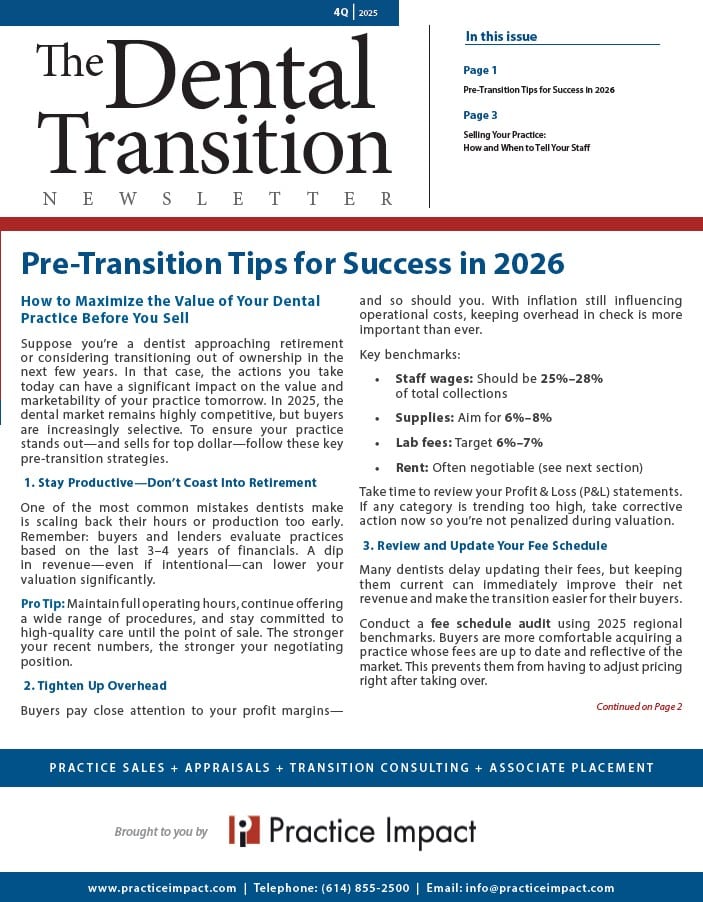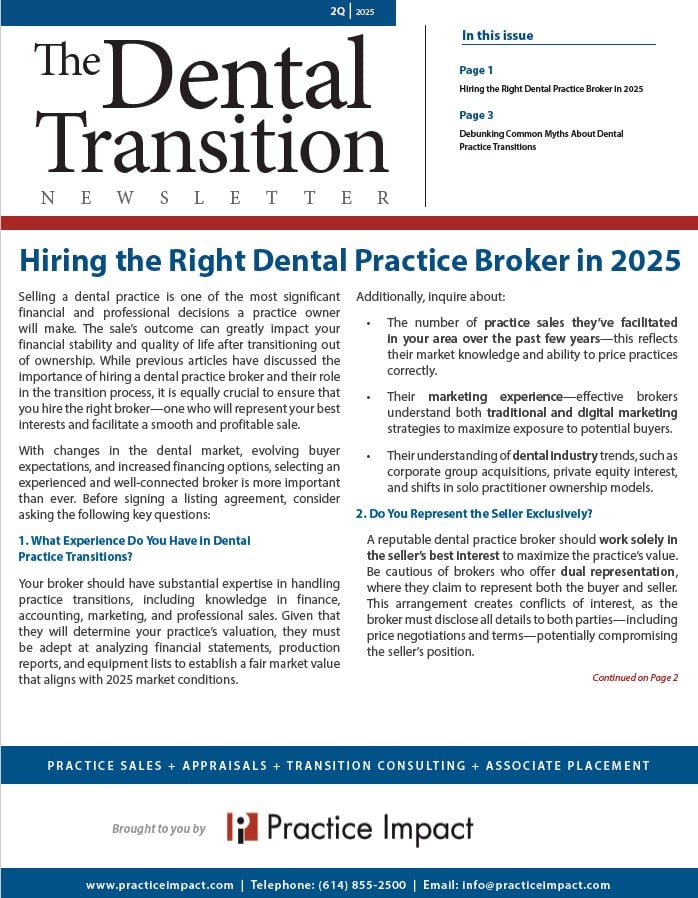Making the Decision to Sell Your Practice
Making the decision to sell your dental practice is one of the most important decisions you will make in your professional life. Therefore, it is imperative that you put a great deal of thought into when and how you would like the transition of ownership to occur. Here are some of the key considerations you should take into account when planning your practice transition:
Financial Considerations
For many doctors, their dental practice is one of their most valuable assets and the proceeds from the sale of their office will be utilized to fund a significant portion of their retirement. Therefore, it is crucial for you to understand the key factors that influence the value and marketability of your practice to ensure that you are in the position to maximize the value of your office at the point of sale. While the average sales price of a dental practice from a regional perspective is approximately 62% -63%% of the most recent year’s revenue, there are a number of other factors that can influence value in either direction, including revenue trends, profitability, type of patient base, type of dentistry, location (urban vs. rural, high visibility vs. low visibility), quality and age of equipment, curb appeal, etc.
The first step in the transition process is to obtain a practice valuation from a local, reputable practice broker so you and your financial advisors can determine if you are financially prepared to sell your office. It is also important to remember that selling your office is not synonymous with retiring, as there may be opportunities for you to continue generating personal income following the sale by working as an associate in your office or outside of the non-compete radius. Once you have determined that you are financially prepared to sell your practice, it’s time to move onto considering the emotional implications of the sale.
Emotional Considerations
We have found that the emotional process of selling a practice often plays a more significant role than the financial implications. For many practice owners, it is extremely difficult to consider selling their practice due to the emotional ties the doctor has to their patient base, staff, and the business they have spent their entire career building. These emotions can be even more intense for those doctors who do not have other interests or hobbies outside of practicing dentistry. Therefore, it’s important to ask yourself these questions before making the decision to sell:
· How strong is my emotional connection to my practice?
· What interests or hobbies do I have to keep me busy following the sale?
· Am I ready to give up control of my practice?
· If you plan to continue working in your office following the sale, are you willing to adopt an “associate mentality” and be accepting of change?
It is also worth mentioning that the emotional implications associated with the sale of your practice will increase once you accept an offer and begin navigating the closing process. By asking yourself the above questions and dealing with these feelings prior to putting your practice on the market, you will be in the position to minimize your anxiety as you navigate the transition process.
The Importance of Planning Ahead
As practice brokers, we are often contacted by practice owners on the day they are ready to sell. In that situation, the doctor’s options are relatively limited in regards to the type of transition strategy they can utilize to sell their office. As is often the case, the doctor has also taken their foot off the gas in recent years, resulting in a significant decline in revenue, profitability, and practical value. To avoid these mistakes, we encourage you to develop a relationship with a local, reputable practice broker at least three years in advance of your practice transition. In doing so, you will gain valuable insight regarding the current value of your practice and the key factors that impact practice value and marketability. This information will also provide you with sufficient time to develop a customized transition strategy to meet your individual needs, make changes to your office that will enhance value, and avoid mistakes that may negatively impact value.
Over the past few years, market conditions have been favorable for sellers, as there has been strong demand for dental practice acquisition opportunities coupled with a limited supply of sellers (creating a seller’s market) and lenders have been providing buyers with 100% financing at historically low interest rates. While market conditions remain favorable at the moment, we are expecting several changes to occur over the next few years that could have a significant impact on practice value:
1. Practice value is heavily impacted by a fundamental economic principle … SUPPLY AND DEMAND. With the baby boomer generation reaching retirement age over the next few years, we are expecting a large number of practice acquisition opportunities to hit the market, which will bring supply and demand into equilibrium. With more practices on the market, sellers will be competing with each other to make their practice stand out from the crowd. As a result, those offices with negative attributes such as declining revenue, high overhead, and/or antiquated equipment/technology will become more difficult to sell and realize a significant decline in value.
2. While we anticipate that the banks’ appetite for practice acquisition loans will remain strong, interest rates are expected to increase significantly over the next few years. Considering that most buyers are counting on 100% financing to fund their practice purchase, an increase in interest rates will have a negative impact on cash flow and an adverse impact on practice values.
3. Here are several other market conditions that could have a negative impact on practice value: (1) Increase in student loan debt; (2) Downward pressure on pricing for dental services (PPO involvement) and upward pressure on practice overhead; and (3) The burden of owning/managing a dental practice is increasing dramatically (the business side of dentistry is becoming more complex).
Given the expected changes on the horizon for the practice transition marketplace, it is more important than ever for potential sellers to understand the factors that influence value and take the necessary steps to maximize practice value, beginning with considering the financial and emotional implications of a practice sale and planning for their transition in advance.





